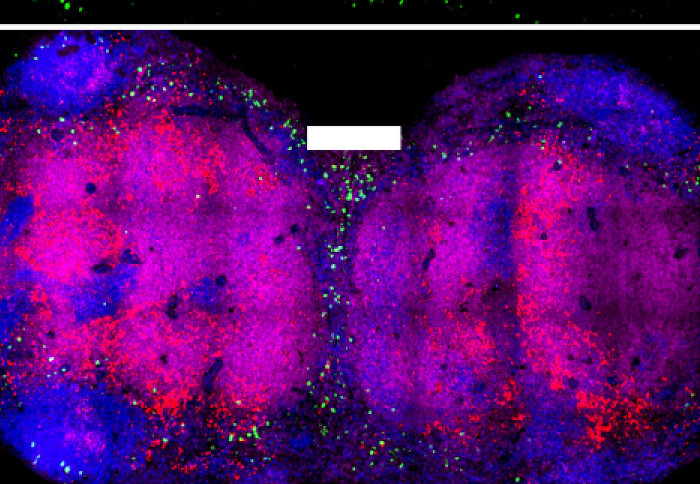White blood cell ‘security guard’ and community messages: News from the College

Here’s a batch of fresh news and announcements from across Imperial.
From a white blood cell playing a ‘security guard’ role, to the President’s call for collaboration and community, here is some quick-read news from across the College.
Patrolling eye

Researchers from Imperial have discovered a new ‘security guard’ role for a type of white blood cell called a neutrophil.
Previously, researchers thought neutrophils circulate in our bodies and swarm to areas affected by injury or infection. But a new study, led by Professor Edwin Chilvers in the National Heart and Lung Institute and colleagues at the University of Cambridge, shows that some neutrophils are already present in people’s lymph nodes (part of our immune system) even when there was no ‘call to arms’ due to an infection or injury.
The new research suggests these lymph node neutrophils are special and keep a watchful ‘patrolling’ eye for invaders to our immune system. They do this by sampling for potential danger signals including bacterial and antigens – and route them to our lymph nodes so that a full immune response can be activated when needed.
Read the full story in Proceedings of the National Academy of Sciences: ‘Phenotypically distinct neutrophils patrol uninfected human and mouse lymph nodes’
Hundred-year hexagonal quest

Transition metal complexes are molecules that contain a central metal atom connected to further atoms through metal–ligand bonds. They are widely used in areas such as catalysis, synthesis and materials science, and the way their constituent parts are arranged (their geometry) can strongly affect their properties and how they can be used.
Now, researchers from the Department of Chemistry at Imperial have discovered a new geometry for transition metal complexes that was first proposed more than 100 years ago but never realised in simple systems.
The team created complexes with six atoms each connected to a central metal but only weakly connected to each other, forming a ‘hexagonal planar geometry’. They will next test the properties and reactivity of these new complexes, potentially uncovering new phenomena that can be exploited to design new materials and catalysts.
Read more in Nature: ‘A hexagonal planar transition-metal complex’
New wings
 Professor Lorenzo Iannucci, of the Department of Aeronautics, has been awarded the Airbus / Royal Academy of Engineering Research Chair in Advanced Composite Design for Aircraft Structures.
Professor Lorenzo Iannucci, of the Department of Aeronautics, has been awarded the Airbus / Royal Academy of Engineering Research Chair in Advanced Composite Design for Aircraft Structures.
He will work with Airbus to develop new Predictive Virtual Testing (PVT) techniques to help develop the next generation of composite aircraft structures.
PVT lets engineers test new materials and their impact on new aircraft in a virtual space. Using this virtual space saves time and money on aircraft design by letting engineers test and predict how new designs will behave before they’re built.
Professor Iannucci said: “My first experience of aeronautics was building balsa wood model aircraft; balsa wood being a very low-cost composite material. It’s now very exciting to be involved in developing advanced simulations tools, which could lead to fundamentally new structural wing designs using some of the latest composite materials and manufacturing techniques. It’s a fascinating time to be involved in such developments, especially with the continuous need to improve sustainability.”
University as a Community
 Professor Alice Gast, President of Imperial, has reflected on the importance of community in her annual autumn message to the Imperial community.
Professor Alice Gast, President of Imperial, has reflected on the importance of community in her annual autumn message to the Imperial community.
In the message, she says that the prospect of Brexit and broader political uncertainty means that a strong community is crucial.
Professor Gast said: “These are times when our community is especially important, when we need to come together to support one another and to understand and address problems that affect us in various ways.”
Professor Gast also announced a new project to improve, increase and enhance common spaces on campus through a new President’s Community Fund. She called on the Imperial community to share their ideas and thoughts on how to enhance the College’s sense of community.
–

Want to be kept up to date on news at Imperial?
Sign up for our free quick-read daily e-newsletter, Imperial Today.
Article text (excluding photos or graphics) © Imperial College London.
Photos and graphics subject to third party copyright used with permission or © Imperial College London.
Reporter
Caroline Brogan
Communications Division
Deborah Evanson
Communications Division
Ms Helen Johnson
Communications Division
Hayley Dunning
Communications Division
Andrew Youngson
Communications Division